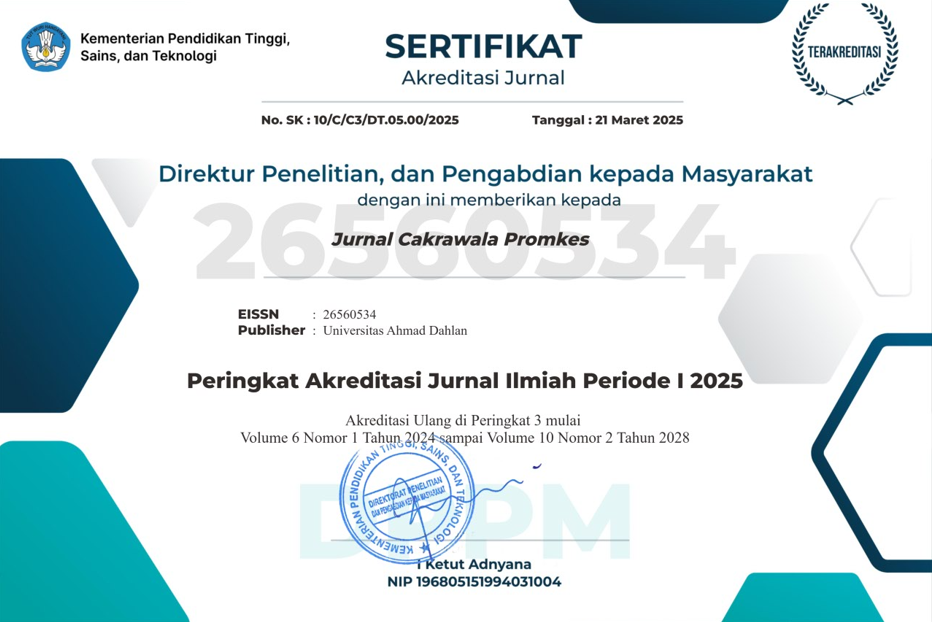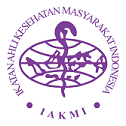Pengaruh pendidikan anak usia dini terhadap perkembangan kondisi sosial-emosi anak usia prasekolah
DOI:
https://doi.org/10.12928/promkes.v2i1.1775Keywords:
Pre-Schoolers, Early childhood education, Social and emotional developmentAbstract
The social and emotional development of young children is affected by many stimulating factors, and one of those factors is early childhood education. However, not all pre-school children have the opportunity to attend early childhood education. This study was aimed at comparing children social and emotional development of those who attend and do not attend early childhood education. This comparative study was carried out using a cross-sectional approach among 72 participants divided into 2 groups: 36 participants who attend early childhood education and 36 participants who do not attend early childhood education. Accidental sampling technique was applied to select samples, Non-parametric statistical test employed was the Mann Whitney test. The comparison value of children attending and not attending early childhood education was P-value 0.000; the emotional comparison value was P-value 0.040. It means there were differences in social and emotional development between children who attend early childhood education and those who do not attend early childhood education. It can be concluded that early childhood education can help stimulate the development of children. Parents should pay more attention to their children social and emotional development, whereas if parents cannot be the medium to support children’s social and emotional development, they should engage their children in early childhood education.
References
2. Kemenkes RI. Profil Kesehatan Indonesia 2016. Keputusan Mentri Kesehatan. RI: Jakarta; 2017.
3. Pekdogan S, Akgul E. Preschool Children’s School Readiness. Int Educ Stud. 2016;10(1):144.
4. Hariani. Permasalahan Perkembangan Sosial dan emosi anak usia dini. J Psikol. 2015;4(2).
5. Al Khudri, S., Heleni, F., Sean, M E. Persepsi Orang Tua terhadap Pemecahan Masalah Temper Tantrum Anak Usia Dini. 2017;3(1):111–5.
6. Fajarini F, Khaerani NM. Kelekatan aman, religiusitas, dan kematangan emosi pada remaja. J Psikol Integr. 2014;2(1):22–9.
7. Denham SA, Bassett HH, Zinsser K. Early childhood teachers as socializers of young children’s emotional competence. Early Child Educ J. 2012;40(3):137–43.
8. Jahja Y. Psikologi Perkembangan. jakarta: kencana; 2011.
9. Rahmawati NA. Hubungan Pendidikan Anak Usia Dini dengan Perkembangan Anak Usia 4-5 Tahun di Desa Tawanreja, Bareng, Klaten. J Involusi Kebidanan. 2015;5(15):7.
10. Indanah I, Yulisetyaningrum Y. Perkembangan Sosial Emosional Anak Usia Pra Sekolah. J Ilmu Keperawatan dan Kebidanan. 2019;10(1):221.
11. Wulandari R, Ichsan B, Romadhon YA. Perbedaan Perkembangan Sosial Anak Usia 3-6 Tahun Dengan Pendidikan Usia Dini Dan Tanpa Pendidikan Usia Dini Di Kecamatan Peterongan Jombang. Biomedika. 2017;8(1):47–53.
12. Lisardika AV, Murti HAS. Perbedaan Kematangan Sosial Anak Usia Dini Ditinjau Dari Keikutsertaan Di Taman Penitipan Anak (TPA). Psikologika J Pemikir dan Penelit Psikol. 2017;22(2):89–100.
13. Anggraini H, Emmanuel S. Hubungan Kelekatan dengan Kecerdasan Emosi Pada Sosial Anak Usia Dini. J Pedagog. 2016;07(02):18–26.
14. Susanto. Perkembangan anak usia dini. jakarta: kencana; 2011.
15. Santrock. Perkembangan Anak. Jakarta: Erlangga; 2009.
16. Septiani R, Widyaningsih S, Khabib M, Igomh B, Studi P, Keperawatan I, et al. Tingkat Perkembangan Anak Pra Sekolah Usia 3-5 Tahun Yang Mengikuti Dan Tidak Mengikuti Pendidikan Anak Usia Dini (Paud). J Keperawatan Jiwa. 2016;4(2):114–25.
17. Siregar. Kemampuan Tenaga pendidik dalam meningkatkan kebugaran anak usia dini. J Pendidik anak. 2011;7(1).
18. Tirtayani, Asril N, Wirya I. perkembangan sosial emosional pada anak usia dini. yogyakarta: Graha Ilmu; 2014.
19. Erikson EH. Chidhood and societ. In: childhood and societ. yogyakarta: pustaka pelajar; 2010.
20. Putri CIH, Primana L. Gambaran Perilaku Disregulasi Emosi Anak Prasekolah Usia 3-4 Tahun. J Ilm Psikol Terap. 2018;6(1):102.
Downloads
Published
Issue
Section
License
Copyright (c) 2020 Asmarita Asmarita, Abdurrahman Hamid, Agnita Utami

This work is licensed under a Creative Commons Attribution-ShareAlike 4.0 International License.
Authors who publish with JCP: Jurnal Cakrawala Promkes agree to the following terms:
- Authors retain copyright and grant the journal the right of first publication with the work simultaneously licensed under a Creative Commons Attribution License (CC BY-SA 4.0) that allows others to share the work with an acknowledgement of the work's authorship and initial publication in this journal.
- Authors are able to enter into separate, additional contractual arrangements for the non-exclusive distribution of the journal's published version of the work (e.g., post it to an institutional repository or publish it in a book), with an acknowledgement of its initial publication in this journal.
- Authors are permitted and encouraged to post their work online (e.g., in institutional repositories or on their website) prior to and during the submission process, as it can lead to productive exchanges, as well as earlier and greater citation of published work.

This work is licensed under a Creative Commons Attribution-ShareAlike 4.0 International License












